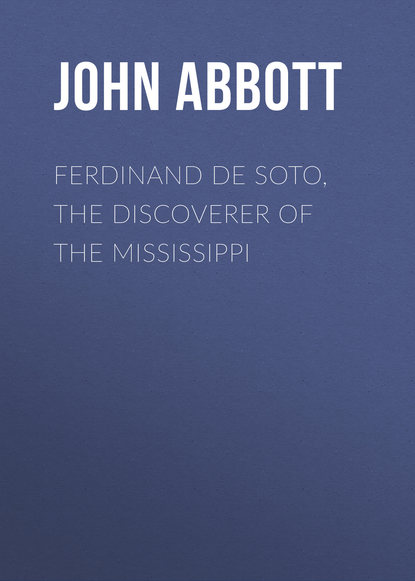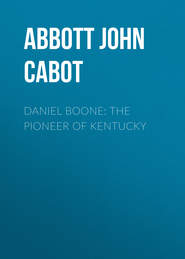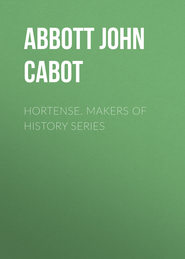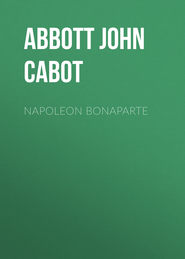По всем вопросам обращайтесь на: info@litportal.ru
(©) 2003-2024.
✖
Ferdinand De Soto, The Discoverer of the Mississippi
Настройки чтения
Размер шрифта
Высота строк
Поля
"In that you do well," rejoined M. Codro. "Still it is your duty to use such human means as may be required to defend yourself against open violence or fraudful malice."
De Soto thanked the astrologer for the caution he had given him, and as he reflected upon it, saw that it was indeed necessary to be constantly on his guard. As time passed on Don Pedro became more undisguised in his hostility to De Soto. Ferdinand and Isabella exerted all their ingenuity to correspond with each other. Don Pedro had been equally vigilant in his endeavors to intercept their letters; and so effectual were the plans which he adopted, that for five years, while the lovers remained perfectly faithful to each other, not a token of remembrance passed between them.
These were weary years to De Soto. He was bitterly disappointed in all his expectations. There was no glory to be obtained even in victory, in riding rough-shod over the poor natives. And thus far, instead of victory attending the Spanish arms, defeat and disgrace had been their doom. Moreover, he was astonished and heartily ashamed when he saw the measures which his countrymen had adopted to enrich themselves. They were highway robbers of the most malignant type. They not only slaughtered the victims whom they robbed, but fired their dwellings, trampled down their harvests and massacred their wives and children.
The most extravagant tales had been circulated through Europe respecting the wealth of the New World. It was said that masses of pure gold could be gathered like pebble stones from the banks of the rivers, and that gems of priceless value were to be found in the ravines. De Soto had been now five years on the isthmus of Darien, and had acquired neither fame nor fortune, and there was nothing in the prospect of the future to excite enthusiasm or even hope.
There was quite a remarkable man, made so by subsequent events, under the command of Don Pedro. His name was Francisco Pizarro. He was a man of obscure birth and of very limited education, save only in the material art of war. He could neither read nor write, and was thus intellectually hardly the equal of some of the most intelligent of the natives. We have briefly alluded to him as entrusted with the command of one portion of the army in the inglorious expedition against Uracca. De Soto had very little respect for the man, and was not at all disposed as a subordinate officer to look to him for counsel. Don Pedro, however, seems to have formed a high opinion of the military abilities of Pizarro. For notwithstanding his ignominious defeat and retreat from Veragua, he now appointed him as the leader of an expedition, consisting of one hundred and thirty men, to explore the western coast of the isthmus by cruising along the Pacific Ocean.
Pizarro set sail from Panama on the fourteenth of November, 1524, in one small vessel. It was intended that another vessel should soon follow to render such assistance as might be necessary. De Soto was urged to become one of this party; but probably from dislike of Pizarro, refused to place himself under his command.
The vessel, which was soon joined by its consort under Almagro, coasted slowly along in a northerly direction, running in at every bay, and landing whenever they approached a flourishing Indian village, plundering the natives and maltreating them in every shameful way. At length they aroused such a spirit of desperation on the part of the natives, that they fell upon the buccaneers with resistless ferocity. Two-thirds of the miscreants were slain. Pizarro barely escaped with his life, having received severe wounds and being borne to his ship in a state of insensibility.
While Pizarro was absent on this ill-fated expedition, a new trouble befell Don Pedro. Las Casas, a devoted Christian missionary, whose indignation was roused to the highest pitch by the atrocities perpetrated upon the Indians, reported the inhuman conduct of Don Pedro to the Spanish government. The King appointed Peter de Los Rios to succeed him. The new governor was to proceed immediately to Panama and bring the degraded official to trial, and, if found guilty, to punishment. The governor of a Spanish colony in those days was absolute. Don Pedro had cut off the head of his predecessor, though that predecessor was one of the best of men. He now trembled in apprehension of the loss of his own head. Conscious of his deserts, he was terror-stricken.
About four or five hundred miles north of Panama there was the magnificent province of Nicaragua. The isthmus is here about one hundred and fifty miles in breadth, and the province being about two hundred miles in a line from north to south, extended from the Atlantic to the Pacific shores. Don Pedro was popular with his brutal soldiery, since he allowed them unlimited license and plunder. He resolved, surrounded by them, to take refuge in Nicaragua. Nevertheless, to render himself as secure as possible, he decided to send an agent to plead his cause at the Spanish court.
Among those rude, unprincipled adventurers, men of violence and blood, it was very difficult to find a suitable person. At length he fixed with much hesitation upon M. Codro, the astrologer. He was a simple-minded, good man; learned, though very artless. M. Codro was strongly attached to De Soto, the preserver of his life. As we have seen, he was well aware of the peril to which his benefactor was hourly exposed from the malignity of the governor. Gladly therefore he accepted the mission, as he hoped it would afford him an opportunity of conferring some favor upon his imperilled friend.
Don Pedro had adopted the most rigorous measures to prevent any communication between the colony and Spain, which was not subjected to his inspection. He was mainly influenced to this course that he might prevent the interchange of any messages whatever between De Soto and Isabella. The most severe penalties were denounced against all persons who should convey any writing across the seas, excepting through the regular mails. But the grateful M. Codro declared himself ready to run all risks in carrying a letter from De Soto to Isabella. Though De Soto at first hesitated to expose his friend to such hazard, his intense desire to open some communication with Isabella, at length induced him to accept the generous offer.
As we have mentioned, for five years not one word had passed between the lovers. It is said that the following is a literal translation of the letter which De Soto wrote. We cannot be certain of its authenticity, but it bears internal evidence of genuineness, and a manuscript copy is in the library of a Spanish gentleman who has spent his life in collecting documents in reference to the past history of his country:
"Most Dearly Beloved Isabella:
"For the first time within five years, I write to you with some assurance that you will receive my letter. Many times have I written before; but how could I write freely when I had reason to fear that other eyes might peruse those fond expressions which your goodness and condescension alone could pardon? But what reason have I to hope that you can still look with favorable regard on my unworthiness? My mature judgment teaches me that this dream of my youth, which I have so long cherished, is not presumption merely, but madness.
"When I consider your many perfections, and compare them with my own little deserving, I feel that I ought to despair, even if I could empty into your lap the treasure of a thousand kingdoms. How then can I lift my eyes to you when I have nothing to offer but the tribute of an affection which time cannot change, and which must still live when my last hope has departed.
"O Isabella! the expectation which brought me to this land has not been fulfilled. I can gather no gold, except by such means as my honor, my conscience and yourself must condemn. Though your nobleness may pity one on whom fortune has disdained to smile, I feel that your relations are justified in claiming for you an alliance with exalted rank and affluence; and I love you far too well to regard my own happiness more than your welfare. If, therefore, in your extreme youth you have made a promise which you now regret, as far as it is in my power to absolve you from that engagement, you are released. On my side, the obligation is sacred and eternal. It is not likely that I shall ever return to my country. While I am banished from your presence, all countries are alike to me.
"The person who brings you this exposes himself to great danger in his desire to serve me. I entreat you to use such precautions as his safety may require. If your goodness should vouchsafe any message to me, he will deliver it, and you may have perfect confidence in his fidelity. Pardon my boldness in supposing it possible that I still have a place in your remembrance. Though you may now think of me with indifference or dislike, do not censure me too severely for calling myself unchangeably and devotedly, Yours, De Soto."
CHAPTER IV
Demoniac Reign
Giles Gonzales. – Unsuccessful Contest of De Soto with Gonzales. – Bold Reply of De Soto to the Governor. – Cruelty of Don Pedro to M. Codro. – Assassination of Cordova. – New Expedition of Discovery. – Revenge upon Valenzuela. – Reign of Don Pedro at Nicaragua. – Unwise Decision of De Soto.
It was supposed at that time that there must be a strait somewhere north of Panama across the narrow isthmus, which would connect the waters of the Atlantic and Pacific oceans. Several expeditions had been fitted out in search of this all-important passage. Almost invariably a company of priests joined these expeditions, who exerted all their energies to convert the Indians to nominal Christianity. A fanatic adventurer by the name of Giles Gonzales, acquired much celebrity for his success in inducing the natives to accept the Christian faith and to acknowledge fealty to the king of Spain. He was at the head of one hundred steel-clad warriors. His mode of persuasion, though unique, was very potent. When he approached the seat of the chief of Nicaragua, he sent a courier to him with the following message:
"I am coming as a friend to teach you the only true religion, and to persuade you to recognize the most powerful monarch on the globe. If you refuse to yield to my teachings, you must prepare for battle, and I challenge you to meet me in the field."
The gentle and peace-loving natives contemplated with consternation these fierce Spaniards mounted on powerful war horses, animals which they had never before seen, and glittering in coats of mail. They had no religious creed to which they adhered with any tenacity. The Nicaraguan chief unhesitatingly expressed his readiness to accept the new faith, and in token of friendship, sent Gonzales a quantity of gold, equal it is said in value to seventy-five thousand dollars of our money. The Spanish historian Herrera, whose record is generally deemed in the main accurate, says that the chief, his family, and nine thousand of his subjects, were baptized and became Christians. Influenced by this example, and by the glowing representations of the rewards which were sure to follow the acceptance of the Christian faith, more than thirty-six thousand of the natives were baptized within the space of half a year. The baptismal fees charged by Gonzales amounted to over four hundred thousand dollars.
While Gonzales was engaged on his own responsibility in this career of spiritual conquest, with its rich pecuniary accompaniment, Don Pedro sent two of his generals, Ferdinand de Cordova and Ferdinand De Soto, to explore Nicaragua and take possession of it in his name. He assumed that Gonzales, acting without authority, was engaged in a treasonable movement. The two parties soon came into collision.
De Soto, with a party of fifty men, twenty of them being well mounted cavaliers, encamped at a small village called Torebo. Gonzales was in the near vicinity with a little army of three hundred men, two hundred of whom were Indians. In the darkness of the night, Gonzales fell upon De Soto, and outnumbering him six to one, either killed or took captive all the thirty footmen; while the cavaliers, on their horses, cut their way through and escaped. Gonzales lost fifty of his best men in the conflict, and was so impressed with the military vigor of De Soto, that he was not at all disposed again to meet him on the field of battle. He therefore retired to a distant part of the province, where he vigorously engaged in the work of converting the natives, never forgetting his baptismal fee.
De Soto and Cordova established themselves in a new town which they called Grenada. Here they erected a church, several dwelling houses, and barracks for the soldiers. They also surrounded the village with a trench and earthworks, as protection from any sudden assault. Gonzales was a fugitive from justice, having assassinated an officer sent by Hernando Cortes to arrest him.
Cordova was a mild and humane man. Under his sway the Indians were prosperous and happy. Two flourishing towns grew up rapidly quite near each other, Leon and Grenada. The climate was delightful, the soil fertile, the means of living abundant. Many of the inhabitants of Panama emigrated to this more favored region.
De Soto, leaving Cordova in command of Nicaragua, returned to Panama to report proceedings to Don Pedro. It was not till then that he learned, to his extreme regret, that the Governor had selected Nicaragua as a place for his future abode. He knew that the presence of the tyrannical governor could only prove disastrous to the flourishing colony, and ruinous to the happiness of the natives. The gloom with which the contemplation oppressed his mind spread over his speaking countenance. The eagle eye of the suspicious governor immediately detected these indications of discontent. With an air of deference, but in a tone of mockery, he said:
"I judge from your appearance, captain, that my Nicaraguan enterprise does not meet with your cordial approbation."
De Soto boldly, and with great deliberation of words, replied:
"Governor Don Pedro, I confess that I feel but little interested in any of your movements or intentions, except when they encroach upon the rights of others. Nicaragua is at this time well governed by Ferdinand de Cordova. The change you propose to make, is to be deprecated as one of the greatest misfortunes that could befall not only the Indian inhabitants of that district, but our own countrymen likewise, who have flocked thither to escape from your jurisdiction."
The countenance of Don Pedro became pallid with rage. Struggling, however, to suppress the unavailing outburst of his passion, he said, with a malignant smile:
"I thank you, Captain De Soto, for giving me this opportunity which I have so long desired. Were I to permit such insolence to go unpunished, my authority in this colony would soon be at an end."
"It is at an end," replied De Soto. "You must be aware that your successor, De Los Rios, is now on his way to Panama."
"I do not choose," replied Don Pedro, "to debate this matter with you. I still claim the right to command you as your superior military officer. I now command you to hold yourself and your company in readiness to march. When we arrive at Leon, I promise you that full justice shall be done to your friend De Cordova, and to yourself."
De Soto fully comprehended the significance of these threats. He wrote immediately to Cordova, urging him to be on his guard. The inhabitants of Leon and Grenada, learning of the intention of Don Pedro, – to take the government into his own hands, – entreated De Cordova to resist the tyrant, promising him their unanimous and energetic support. But De Cordova declined these overtures, saying, that all the authority to which he was legitimately entitled was derived from Don Pedro, and that it was his duty to obey him as his superior officer, until he should be deposed by the Spanish crown.
Just before Don Pedro, with his suite, left Panama for Nicaragua, M. Codro returned from Spain. He brought dispatches to the governor, and also secretly a letter from Isabella to De Soto. The spies of the governor, in his castle in Spain, watched every movement of M. Codro. The simple minded man had very little skill in the arts of duplicity. These spies reported to Don Pedro that M. Codro had held a secret interview with Isabella, and had frankly stated that he was entrusted with a private message to her. Don Pedro knew that such a message could have gone only from De Soto; and that unquestionably M. Codro had brought back from his daughter a response. We may remark in passing, that the letter from Isabella to De Soto informed him of the inflexible fidelity of Isabella, and filled the heart of De Soto with joy.
The malignant nature of Don Pedro was roused by these suspicions to intensity of action, and he resolved upon direful revenge. As the new governor was hourly expected, he could not venture upon any open act of assassination or violence, for he knew that in that case summary punishment would be his doom. Calling M. Codro before him, he assumed his blandest smile, thanked the artless philosopher for the services he had rendered him in Spain, and said that he wished to entrust him with the management of a mineralogical survey of a region near the gulf of San Miguel.
The good man was delighted. This was just the employment which his nature craved. He was directed to embark in a vessel commanded by one of the governor's tools, an infamous wretch by the name of De Valenzuela. This man had been for many years a private, and was then engaged in kidnapping Indians for the slave trade. He was ordered as soon as the vessel was at sea, to chain M. Codro to the foremast, to expose him to all the tortures of the blaze of a tropical sun by day and chilling dews by night. The crew were enjoined to assail him with insulting mockery. Thus exposed to hunger, burning heat, and incessant abuse, he was to be kept through these lingering agonies until he died.
For ten days the good man bore this cruel martyrdom, when he breathed his last, and was buried on a small island about a hundred miles southwest of Panama. This brutal assassination was so conducted, that De Soto at the time had no knowledge of the tragedy which was being enacted.
Early in the year 1526, Don Pedro, surrounded by a large retinue of his obedient soldiery, left Panama to assume the government of Nicaragua, to which he had no legitimate title. De Soto accompanied the governor. Much as he detested his character, he could not forget that he was the father of Isabella. When Don Pedro approached the little town of Leon, he sent a courier before him, to order De Cordova to meet him in the public square, with his municipal officers and his clergy, prepared to give an account of his administration.
De Soto with his horsemen was ordered to form in line on one side of the square. The foot soldiers of Don Pedro surrounded the governor on the other side. All the vacant space was filled with citizens and natives. By the side of the governor stood his executioner; a man of gigantic stature and of herculean strength, whose massive sword few arms but his could wield. De Cordova advanced to meet Don Pedro, and bowing respectfully before him, commenced giving an account of the state of affairs in the province. Suddenly he was interrupted in his narrative by Don Pedro, who with forced anger exclaimed:
"Silence, you hypocrite! Your treasonable projects cannot be hidden under these absurd pretensions of loyalty and patriotism: I will now let your accomplices see how a traitor should be punished."
He made a sign to his executioner. His gleaming sword flashed through the air, and in an instant the dissevered head of Cordova rolled in the dust. The headsman grasped the gory trophy by the hair, and raising it high above his head exclaimed,
"Behold the doom of a traitor."
All this took place in an instant. The spectators were horror stricken. De Soto instinctively seized his sword, and would doubtless have put spurs to his horse, rushed upon the governor, and plunged the weapon to the hilt in his breast, but for the restraining memories of the past. Hesitatingly he returned his sword to its scabbard.
But Don Pedro had not yet finished the contemplated work of the day. Another victim he had doomed to fall. A file of soldiers, very resolute men, led by a determined officer, crossing the square, approached De Soto, at the head of his troops. Don Pedro then exclaimed in a loud voice,
"Ferdinand De Soto, you are ordered to dismount and submit yourself to the punishment which you have just seen inflicted on your traitorous comrade. Soldiers! drag him from his horse if he refuse to obey."
The officer reached forth his hand to seize De Soto. Like lightning's flash, the sword of the cavalier fell upon the officer, and his head was cleft from crown to chin. The spurs were applied to the fiery steed. He plunged through the soldiers, knocking several of them down, and in an instant De Soto had his sword's point at the breast of the governor. Shouts of "kill the tyrant," rose from all parts of the square, which were echoed even from the ranks of Don Pedro's soldiers. Again De Soto held back his avenging hand; but in words which made Don Pedro quake in his shoes, he said,
"You hear the expression of public sentiment. You hear the wishes of those who are subject to your authority. It is the voice of justice speaking through these people. In refusing to obey the call, I am scarcely less guilty than yourself. But remember, Don Pedro, that in sparing your life at this moment, I discharge all the obligations I have owed you. Miserable old man! Be thankful that the recollection of one that is absent, can make me forget what I owe to my murdered friend.











